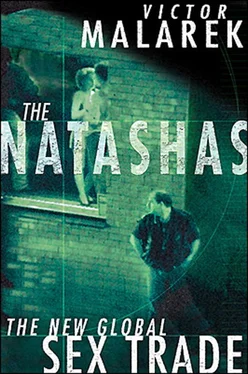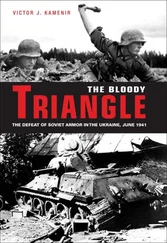Mary Robinson, UN High Commissioner for Human Rights, agrees. In a blunt speech at the Palais des Nations in Geneva a year later, she told a hushed audience that “little has changed for those caught up in this sordid trade. Attempts to deal with trafficking have, thus far, been largely ineffective… More people are being trafficked than ever before.”
At a May 2003 conference in Noordwijk, the Netherlands, Hamish McCullock, who heads up Interpol’s human trafficking group, pointed out that trafficking in Eastern European women is “very much on the increase.” A key factor for this, he said, is the rise in “sexual tolerance levels” throughout Western Europe. He also noted that better job opportunities for women from the European Union have put a damper on the trade. Fewer and fewer of them view prostitution as a legitimate line of work, leaving pimps and brothel owners scrambling to find another source. And for those at the helm of the sex industry, many of whom are tied to organized crime, there is no easier target than the impoverished women of Eastern Europe.
Trafficking in women is not new, nor has the world just discovered that its women are being abducted, sold and raped. As early as 1989 the European Parliament adopted a resolution urgently calling for tough measures to “eradicate this practice.” In 1995, at the Fourth World Conference on Women in Beijing, representatives from 189 countries unanimously adopted a
“Platform for Action” calling on governments around the world to “dismantle criminal networks engaged in trafficking women.” And at a December 2000 world summit on organized crime in Palermo, Italy, grim-faced leaders from more than eighty countries lined up to sign the United Nations Protocol to Prevent, Suppress and Punish Trafficking in Persons, Especially Women and Children. In his closing remarks at the summit, Pino Arlacchi, then under-secretary-general of the UN, proudly proclaimed, “We all made history in Palermo.” The fact that so many nations signed the protocol demonstrated “a strong and clear international commitment to achieving early ratification.” Arlacchi called on countries to “ensure that the convention and its protocols enter into force within the coming twelve months.”
After three years of languishing in limbo, the UN Protocol finally received its fortieth ratification, enabling it to come into force on December 25, 2003. As of May 2004, fifty-two countries have ratified the document, which means they have ensured that their national policies and practice fully comply with the protocol. Unfortunately, most of the key sending and receiving countries have not signed. They include the U.S., the United Kingdom, Australia, Ireland, Germany, the Netherlands, Austria, Belgium, Greece, Italy, Israel, Japan, Russia, Ukraine, Moldova and the Czech Republic. Ironically, ratification has come from four of the more egregious trafficking offenders—Albania, Serbia, Bulgaria and Bosnia-Herzegovina—yet little has changed in these or other countries.
None of this comes as a surprise to the tiny bands of dedicated women and men working on the ground to save the victims. They know full well that, absent political will at the upper echelons of power, all the conferences, training programs, newly minted laws and wordy international protocols won’t matter one bit.
Many government leaders choose instead to blame the sending countries, as if it’s their fault that these “loose women” are staining their reputations. But the trade is driven by the lust of their men; it is fueled by the bars, brothels and bordellos dotting their streets; and it thrives because of their complacency and inaction.
In many of the sending nations, meanwhile, the attitude is “out of sight, out of mind.” Local authorities argue that because the women are taken outside their borders, they have no jurisdiction or authority to act. This is a cop-out. These girls are among the most vulnerable in their society. They are the nation’s daughters. They need and deserve the full protection of the state, and when they don’t get it, it’s a clear sign of corruption. The trafficked women are local . The recruiters are local . The women are being smuggled across their borders with bogus travel documents and passports. The local police see the villages and towns being emptied of young women, and they know what’s behind the mass exodus. It doesn’t take a rocket scientist to read a newspaper ad and see it for what it really is—a trafficking trap.
Putting a dent in this criminal enterprise requires a committed, all-out frontal assault. We need action, not just words, from political leaders, and it needs to be put into practice by prosecutors and police. We need to chase down those responsible and try them for their crimes, imposing stiff sentences that reflect the severity of what they’ve done. With the volumes of information now available, it’s galling to watch judges sentence traffickers to mere community service. It’s astounding that informed, seemingly conscientious prosecutors would negotiate plea bargains with bottom-feeding slugs. And it’s disturbing that police continue to turn a blind eye to what goes on in their own backyards.
If a country is to be judged on how it deals with this scourge, that judgment must be based on the action it takes to eradicate it. The only thing that will send these thugs scurrying back into their rat holes is the full force of the law—unwavering prosecution, heavy prison time and confiscation of all profits amassed on the backs of these women. Criminals need to know that buying and selling women is not a misdemeanor and that it will not be tolerated. Not now. Not ever. And johns caught using the services of trafficked women and girls should be served notice that they too will be rounded up, charged, prosecuted and jailed.
Applying the full force of law is also the only way to get through to the corrupt cops and public officials that enable the trade to thrive. None of this could happen without them strenuously craning their necks to look the other way. Nor would police indifference be as big a problem as it is if some of the men in blue weren’t slinking into the brothels and massage parlors for “freebies” on the side.
Despite the worldwide consensus on the urgent need to stop the traffic, the process is mired in endless wrangling over definitions, terminology and interpretations. Only a small number of nations have appointed a national point person or agency to coordinate anti-trafficking strategies. International cooperation on law enforcement remains sparse, and coordination even within countries is often sorely lacking. A few countries, such as the United States, have established interagency bodies to coordinate action among immigration, labor, social services and foreign affairs. Yet even there trafficking cases are frequently jammed up in bureaucratic red tape, with one department not knowing what the other is doing. The officials responsible often haven’t been trained in how to identify trafficking victims, nor are immigration officers, civil servants or front-line police advised how to handle such cases. So they end up taking the easy way out by processing trafficking victims as illegal migrants and then deporting them.
And that’s not the end of it. While trafficking is clearly a global problem, and while the victims and perpetrators move across borders with ease, enforcement is usually a domestic initiative subject to local policies and national laws. Not every country has enacted specific trafficking laws; and those that do exist vary from one country to the next.
Government bureaucrats lament that their nations lack an adequate legal framework to tackle the problem, with the implication that their intentions are thwarted by inadequate laws. Well, let’s get one thing straight. Assault is assault. Confinement is confinement. Rape is rape. And since the sanctions for dealing with these egregious offenses already exist in law in every nation on the planet, nothing prevents them from prosecuting traffickers under their own criminal codes.
Читать дальше












